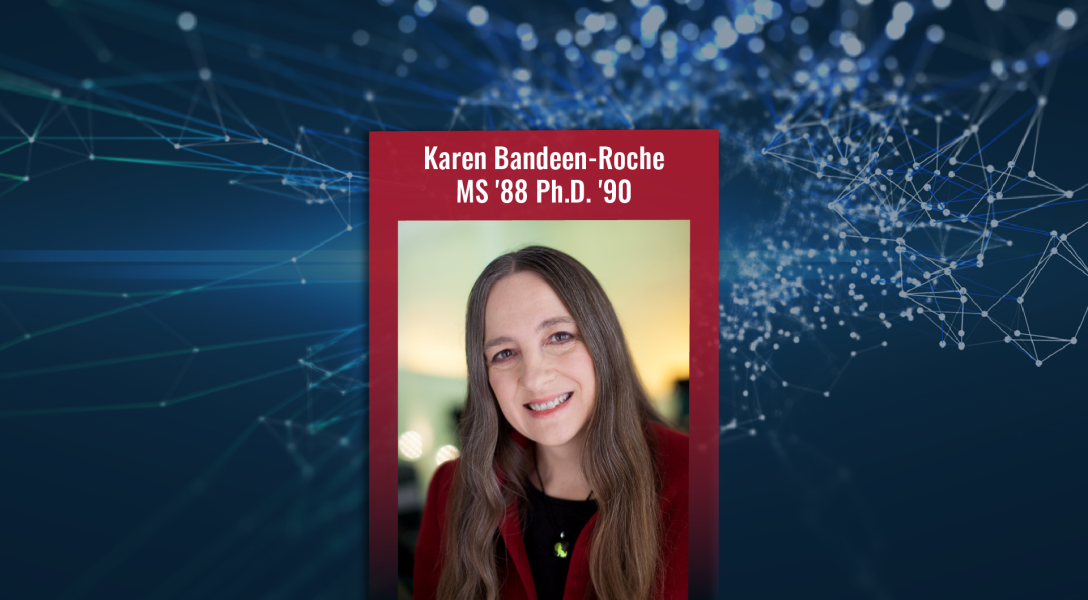Aging isn’t an exact science, but through biostatistics – the science and practice of learning from biomedical data – pioneers like Karen Bandeen-Roche ’88, Ph.D. ’90, have uncovered more accurate ways to measure frailty and resilience in older people as well as the factors that lead to both.
For more than 30 years, Bandeen-Roche – who received her doctoral degree in operations research and industrial engineering from Cornell – has been a leading biostatistician and researcher on aging, frailty, and resilience, publishing nearly 300 peer-reviewed papers throughout her career.
“Before the 1990s, frailty used to be a ‘know it when you see it’ kind of thing, but since then there's been a tremendous arc of research, including everything from how we recognize frailty to ways we can address factors that lead to frailty,” she said.
This week, Bandeen-Roche will receive the Department of Statistics and Data Science’s Cornell Distinguished Alumni Award as part of the department’s annual Celebration of Statistics and Data Science. The day-long celebration, which is open to all Cornellians who register, takes place on Friday, September 8, in the Statler Hotel in the J. Willard Marriott Executive Education Center on the Cornell University campus in Ithaca. The celebration will include talks from seven field leaders, including four Big Red alumni. Bandeen-Roche will give the keynote talk, "Statistical measurement of frailty, resilience and – ultimately – thriving.”
“It means a great deal,” Bandeen-Roche said of the Distinguished Alumni award. “I love Cornell so much and think so highly of my experience and the professors there – particularly David Ruppert, Bruce Turnbull, and Robert Bechhofer.”
Their professional recognition is extremely meaningful, she said.
“Karen’s excellence is unmatched. She’s a pioneer researcher, an extraordinary teacher and mentor, and a visionary who’s served in countless leadership roles over the last three decades,” said Ruppert, the Andrew Schultz Jr. Professor of Engineering in the School of Operations Research and Information Engineering, Professor of Statistics and Data Science, and Bandeen-Roche’s advisor during her doctoral studies. “Through her groundbreaking work, Karen continues to inform our understanding of the factors that lead to health frailty and resilience. It’s an honor to recognize Karen as a Distinguished Alumni.”
A self-described “math geek” from a young age (her father was an atmospheric physicist), Bandeen-Roche discovered a love for statistics early on at Cornell but wasn’t sure to which research area she wanted to apply her budding statistical skills. Honestly, it didn’t matter, she said.
“I was sort of agnostic to how I was going to use statistics, just so long as I was making an impact,” she said.
At Cornell, she leaned into the course flexibility her doctoral program offered, grew closer with fellow classmates who inspired and motivated one another, and relished time spent with world-class professors, like Ruppert.
“I can’t speak highly enough of him as a Ph.D. mentor, and I’m sure I’m not alone in this,” she said. “He fostered that perfect combination of independence without leaving me out to dry. He took career support seriously, and he supports me to this day.”
Following graduation, she was offered a teaching position in the Department of Biostatistics at Johns Hopkins University and, through the guidance of a few mentors, directed her research focus to health, specifically eye conditions and aging.
“Within a year at Johns Hopkins, my research journey on aging had begun,” she said.
And it continues. In her 30-year-plus career at Johns Hopkins, Bandeen-Roche has made signature contributions in methodology for latent variable and multivariate failure time modeling as well as methods to address questions in medicine and epidemiology. She uses biostatistical and medical data to study the physiology that leads to older adults becoming frail or resilient. Being able to measure frailty and resilience allows researchers to home in on possible risk factors and develop mitigating strategies early on, she said.
“Aging evolves. It requires researchers to study factors repeatedly over time,” Bandeen-Roche said. “Statistics is crucial to do just that in a rigorous and valid way.”
Along with pioneering research into aging, she has also held numerous leadership roles, including directorship of the Johns Hopkins Center on Aging and Health and co-leadership in the Older Americans Independence Centers national network. She is a fellow of both the American Statistical Association (ASA) and the Gerontological Society of America, and has served in leadership roles for several biostatistical and statistical organizations.
For the last 15 years, Bandeen-Roche served as the Hurley-Dorrier Professor and Chair of the Department of Biostatistics at the Johns Hopkins Bloomberg School of Public Health. In this role, which she stepped down from in July, Bandeen-Roche mentored individuals and helped the department navigate an era of many changes, including the COVID-19 pandemic.
“Of everything I’ve done professionally, to help other people and my organization thrive and grow is one thing that I’m particularly proud of,” she said.
Looking back on her time at Cornell, Bandeen-Roche credits the Big Red for teaching her how to collaborate.
“The interpersonal environment was so wonderful,” she said. “As students, we learned together and helped each other to solve problems where we’re each bringing our own talents. The foundation of knowledge I learned at Cornell was everything one would need to go on, and then self-learn and thrive.”
By Louis DiPietro, a writer for the Cornell Ann S. Bowers College of Computing and Information Science.



